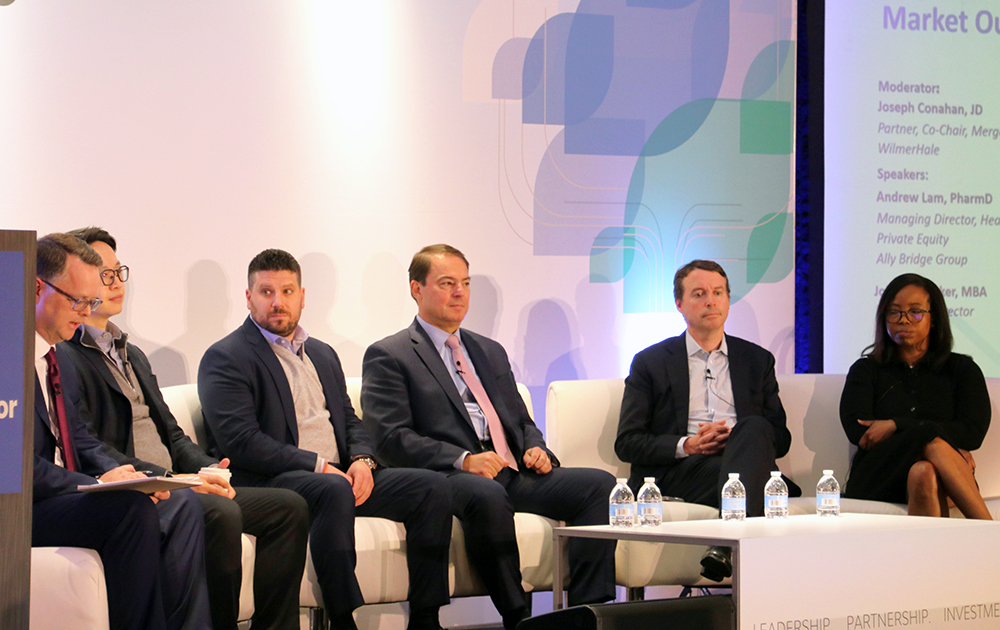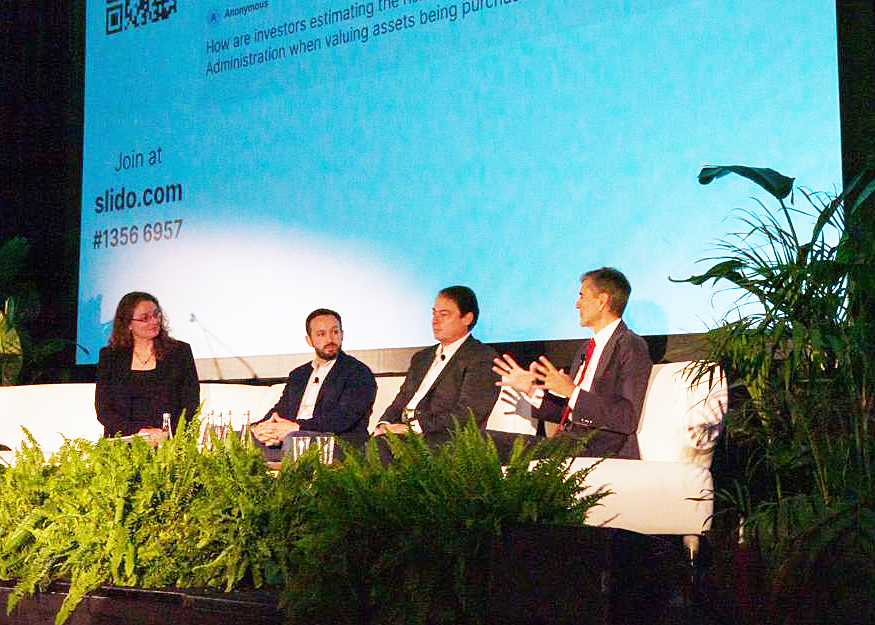When it comes to biotech M&A, 2024 wasn’t a great year, but it wasn’t “horrible,” according to analysts at the BIO CEO & Investor Conference in New York on Feb. 11. And as we enter 2025, the pace of dealmaking seems to be picking up.
“It wasn’t that horrible of an M&A market. There were still 25 deals at $1 billion-plus, which is just slightly off the peak of 2023,” said Evan Matlin, Partner, MTS Health Partners LP. “It was definitely a slow start into 2024. I think activity, at least on the strategic side picked up towards the back half.”
Other experts described similar sentiments about the current and future situation for M&A and investment in biopharma companies during a panel, “Market Outlook: Dealmaking and M&A for 2025.” They warned that new political uncertainty could pose challenges for a slowly improving M&A market, and cautioned that companies need sufficient cash to cover operations if they hope to hold out for a good buyout.
“The cash story is so critical,” said the panel moderator, Joseph Conahan, Partner, Co-Chair, Mergers and Acquisitions Practice – WilmerHale. “If you don’t have a sufficient cash runway, I’ve seen a number of companies get pushed into suboptimal M&A transactions.”
These days, investors seeking acquisitions expect companies to have at least 18 months of ready cash, so firms must cut costs by reducing their pipeline, said Alethia Young, CFO at Bicycle Therapeutics. “You have to prioritize your projects and goals. In a perfect world, we’d love to do 52 things, but we may have to do only four or five,” Young said.
“This is no time to be a hero and show a slide of your pipeline with 28 programs anymore,” agreed Andrew Lam, Managing Director, Head of Biotech Private Equity – Ally Bridge Group.
Operating capital provides independence, said Matlin. “Having cash means you can say no. And that’s always a good position to be in, if you don’t like a valuation,” he explained.
The political and economic factors
Panelists addressed how the dealmaking environment is impacted by economic and political factors.
Big pharma has the cash ready to invest, according to Arda Ural, Americas Life Sciences Sector Leader – EY-Parthenon.
“Our latest report is there is like $1.3 trillion to be deployed. So why are we not seeing that happen?” he asked. Much of the answer comes down to politics and economics. The biggest external economic impact “is going to be the interest rates because that would dictate how you can leverage the deal or not.”
As for political impact, Ural said there are questions around price controls, including how the new administration handles the next 15 drugs eligible for Medicare price controls, as well as talk of using Bayh-Dole “march-in” rights as an alternative means to impose price controls. Until it is clear what the new administration will do, M&A activity will be slow, he said.
“It’s like the old adage, ‘uncertainty is the enemy of deals,’ ” said Conahan. “It’s hard for principals to get deals done in an uncertain environment.”
“It just doesn’t line up right now to be pushing capital into the market, given some of this uncertainty that we’re talking about,” agreed panelist John Whittaker, Managing Director – Citi.
Biotech market trends to watch
Panelists identified areas likely to draw the most interest, including how AI might alter the process of drug development.
Given the difference between actual revenue and revenue targets, major pharma companies are looking for “breakthroughs in terms of moving the needle—typically newcomers that have large addressable markets with high unmet need,” according to Lam.
As for themes to target, “Currently it’s obesity cardiomyopathy, which has for many years been largely out of favor, and select areas in oncology. ACS (antibody drug conjugates) seem to be currently getting a lot of attention, and lesser so genetic diseases.”
Whittaker, Matlin, and Young agreed that large firms are currently most interested in acquisitions that offer hope for blockbuster-level billion-dollar sales.
Along with making big revenue, pharma companies would like to see big savings in costs, which is why we can expect interest in drug development with AI.
Reflecting the opinions expressed in an earlier discussion at the event about AI, this panel said they didn’t believe that AI is close to being ready to handle all the processes of drug discovery. However, it is ready to help the industry realize money and time-saving efficiencies by automating tasks from research through administration.
AI could be a “near-term disruptor” in eliminating inefficiencies in the way we bring drugs to market, and there are many inefficiencies to address, according to Lam.
“If it is taking us a lot longer and is much more expensive to bring a drug through R&D, we need to evaluate how we are doing drug discovery development,” he said. “It just hasn’t been as productive as it was, historically.”




